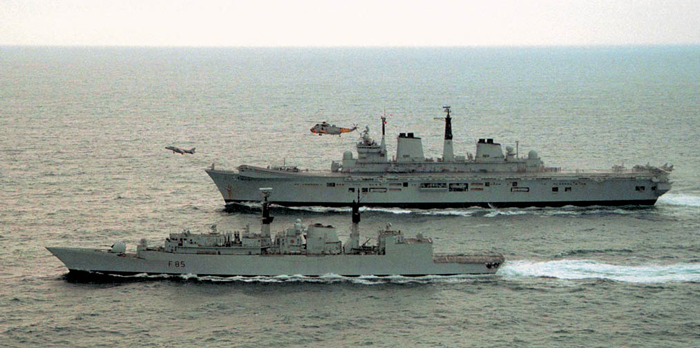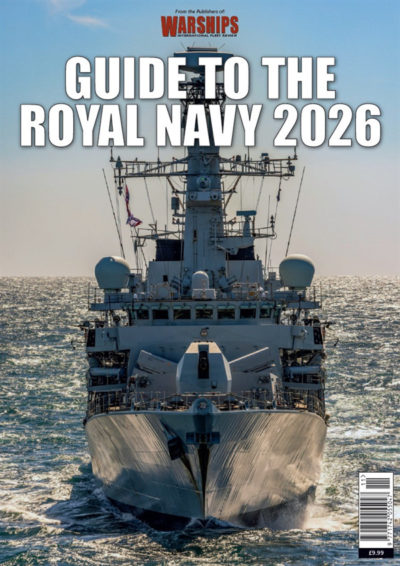
Opinion – Odin’s Eye
Some critics of the UK’s Strategic Defence and Security Review (SDSR) have been dismissed as the FOG – the Falklands Old Guard – but this is neither respectful nor fair to the men who won a great, but
unexpected victory, in difficult circumstances when even the UK’s allies – the USA among them – thought the task of regaining the Falklands in 1982 was impossible. Nor is it insensible to cite the Falkland War as a task, which can no longer be undertaken by British armed forces. The Falklands was an example of strategic shock: An unpredicted event at the strategic level, which surprises us and changes our political, financial and military priorities.

Even in the few months since SDSR was announced there have been several happenings with the potential for strategic shock (a topic that we have discussed here before). These include North Korea’s shelling of South Korea, the civil unrest in North Africa, Egypt and the wider Arab world, and the continuing world financial crisis. It is, by definition, harder to predict what strategic shocks may occur in the future, but, as Colin Gray has reminded us in his book, ‘Another Bloody Century’, there will be war of one sort or another. To meet these dangers, the UK’s Naval Staff is predicting change, yes, but change in straight-line, uniform ways.
By 2020, says the Naval Staff, the Royal Navy will boast all six Type 45 destroyers, be building Type 26 Global Combat Ships (GCS), have seven Astute Class SSNs, and the two QE Class carriers with the Carrier Variant (CV) of the F-35 stealth strike fighter. All are high-end capabilities and all rather modest in number and there are several risks. A major one is the atrophy of skills needed to operate one or two large fixed-wing carriers during the ten year gap in which the UK has no aircraft carriers, not just aviator skills, but the ship handling and the flight-deck skills, too. As commentaries elsewhere in this magazine indicate, the British fleet of the period 2011 to 2020 has been unwisely diminished by the SDSR, with serious force level problems and capability gaps. The SDSR – and there are further chapters of it still to be unveiled – has developed distinctly not to the Navy’s advantage and it is no good pretending otherwise.
This is Year Zero for the Royal Navy: Everything must be recalibrated and all options must be considered. The RN needs to rip it all up and start again. For example, why carry on with the F-35 when its unit costs are spiraling out of control and it won’t be ready until 2020? The former head of the Fleet Air Arm (FAA) Commodore Steve Jermy, suggested in this magazine a few editions ago that the UK Ministry of Defence (MoD) could buy F-18 Super Hornets to close the gap which has developed in the
naval fixed-wing aviation. He has shown how the F-18 solution could be cheaper, and even permanent, as well as giving the British a strike fighter – already being flown by RN aviators from US Navy carriers – to fly from the new HMS Queen Elizabeth from as soon as 2015. Elsewhere, Vice Admiral Jeremy Blackham and Professor Gwyn Prins have suggested the Royal Navy cannot afford the Type 26 if it is to cost, on present proposals, nearly as much as the Type 45. Unit costs for naval vessels are notoriously difficult to compare, given there are so many variables and accounting practices. Costs in the range of £210m (for the new Danish frigate) or £282-378m (for the Franco-Italian multi mission frigate) per unit seem a better option and both are modular, capable of being deployed in a variety of roles. They are also available now.

A follow-on Astute Class SSN armed with a new generation cruise missile might be a cheaper alternative to building a successor to the Vanguard Class SSBN and its replacement Trident missile system. We know there are good reasons a SSBN deterrent is best, but can the UK afford it? But, beyond the question of its material, the RN must look at itself. The Secretary of State for Defence, Dr Liam Fox, in his speech at the First Sea Lord’s conference last December, has shown himself one of the best proponents of the Naval Case, while the current First Sea Lord has said that the National Security Council’s choice of an “Adaptable Britain” global defence posture satisfies him that he scored points in favour of the Navy. However, we have to face the plain truth that the Navy, for whatever reason, lost the argument during the SDSR. Dr Fox said this in his speech: “The centrality of maritime power to Britain’s future is by no means accepted in every quarter … My support for the Royal Navy is not based on historical legacy or sentiment, but on a hard-headed assessment of the future needs of national security. And this is what we must concentrate on in the years ahead. Not on past glories, but on future value that the Navy can bring to UK security.” He also said: “This means not only setting out the case for sea power … but to demonstrate it to the British people regularly and to address the needs of the future by redefining the strategies of the past.” And that is why this is Year Zero for the Royal Navy. The whole Naval Case has to be recalibrated and then it must be communicated with clarity and simplicity, in plain language everybody can understand. The Navy must sell itself better.






Comments
Sorry, comments are closed for this item